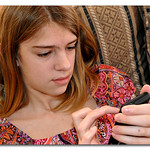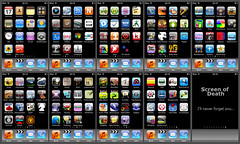 Why did Les Quennevais School, in Jersey, pilot a Bring Your Own Device programme, what challenges have emerged, and how do students use their devices?
Why did Les Quennevais School, in Jersey, pilot a Bring Your Own Device programme, what challenges have emerged, and how do students use their devices?
Responsible Use
 The general thrust of education these days is on student-centred learning. This is often expressed by depicting on the teacher’s role as being the guide on the side rather than the sage on the stage. Regardless of whether you agree that that’s how things should be (and as it happens I don’t: see Please! No More Mantras!), the often-stated philosophy these days is that students know best.
The general thrust of education these days is on student-centred learning. This is often expressed by depicting on the teacher’s role as being the guide on the side rather than the sage on the stage. Regardless of whether you agree that that’s how things should be (and as it happens I don’t: see Please! No More Mantras!), the often-stated philosophy these days is that students know best.
But does stating that philosophy mean that it is observed in practice?
BYOD Case Study: George Spencer Academy
 George Spencer Academy is a mixed secondary school in Nottingham, England, with 1350 students aged 11-18. Although it is located in a large town, it has only a small proportion of students who are eligible for free school meals.
George Spencer Academy is a mixed secondary school in Nottingham, England, with 1350 students aged 11-18. Although it is located in a large town, it has only a small proportion of students who are eligible for free school meals.
The school decided to go down the BYOD road in order to be able to explore the potential of personal devices without incurring costs of purchase, training or technical support. The idea also fits very well with the school’s vision, which is concerned with giving a personalised learning experience to all students.
Recommended reading
 Here is a selection of online articles that I think worth reading – some of them are my own (he says modestly), but others are others’! They cover a wide range of topics, including the flipped classroom, Bring Your Own Technology, what happens in an internet minute, up and coming conferences and others.
Here is a selection of online articles that I think worth reading – some of them are my own (he says modestly), but others are others’! They cover a wide range of topics, including the flipped classroom, Bring Your Own Technology, what happens in an internet minute, up and coming conferences and others.
BYOD Case Study: Finborough School
 Here is an interesting case study of how a small school has successfully introduced BYOD with a particular group of pupils.
Here is an interesting case study of how a small school has successfully introduced BYOD with a particular group of pupils.
Finborough School is an independent, ie private, all-through school, ie age range 2-18, in a rural English setting. It has 274 pupils.
Mobile Learning Case Study: Copland Community School
BYOD Case Study: Archbishop Lanfranc School
 The school is moving towards a totally cloud-based system using mostly mobile technology. Therefore BYOD will become another facet of this by allowing students to use mobiles when appropriate, in addition to the kit provided by the school.
The school is moving towards a totally cloud-based system using mostly mobile technology. Therefore BYOD will become another facet of this by allowing students to use mobiles when appropriate, in addition to the kit provided by the school.What are the features of a good ICT activity?
 I was invited to give a talk recently, and one of the questions I was asked to address was: what are the characteristics of a good ICT activity? This is one of the questions which, at first glance, seems really easy to answer – until you get down to thinking about it. Because what the question is really asking, I think, is what makes a good ICT activity good in a unique way: that is, unique to ICT.
I was invited to give a talk recently, and one of the questions I was asked to address was: what are the characteristics of a good ICT activity? This is one of the questions which, at first glance, seems really easy to answer – until you get down to thinking about it. Because what the question is really asking, I think, is what makes a good ICT activity good in a unique way: that is, unique to ICT.
BYOT Case Study: Scargill Junior School
 Describing itself as being on the ‘networked’ stage of the continuum, Scargill school’s current Bring Your Own Technology model consists of utilising a wide range of mobile devices in school in order to enhance and support the learning in the classroom. It started with Nintendos approximately 6 years ago. But what prompted Scargill to consider a BYOT approach in the first place?
Describing itself as being on the ‘networked’ stage of the continuum, Scargill school’s current Bring Your Own Technology model consists of utilising a wide range of mobile devices in school in order to enhance and support the learning in the classroom. It started with Nintendos approximately 6 years ago. But what prompted Scargill to consider a BYOT approach in the first place?BYOT: the policy that dare not speak its name?
 A couple of months ago Mike Sharples, a researcher at the Open University, told me that he had looked at the websites of some of the schools I was writing up case studies on in connection with their Bring Your Own Technology policy, but was unable to find any references to it whatsoever. He came to the conclusion that:
A couple of months ago Mike Sharples, a researcher at the Open University, told me that he had looked at the websites of some of the schools I was writing up case studies on in connection with their Bring Your Own Technology policy, but was unable to find any references to it whatsoever. He came to the conclusion that:
BYOT is the policy that dare not speak its name.
I have to say that although there are quite a few schools adopting a BYOT approach, finding them has not been easy.
Bring your own thinking
 A few years ago I said to one of my team, having been in the new management post for about a week, “How come nobody here ever takes a decision? How come they always ask me what they should do, especially when they know more about their specialist area than I do?”
A few years ago I said to one of my team, having been in the new management post for about a week, “How come nobody here ever takes a decision? How come they always ask me what they should do, especially when they know more about their specialist area than I do?”
“Because”, came the reply, “Our last boss always had an opinion on everything, and stuck to it whatever anyone else suggested. So we very soon learnt that there was no point in doing any of the thinking for ourselves.”
Mobile phones in education revisited
![]() The most popular article on the ICT in Education website is one by a 17 year-old student called The Importance Of Mobile Phones In Education. To give you an idea of its popularity, I would estimate that it has been viewed at least 30,000 times since it was published back in July 2010. So the question is, why is it so popular?
The most popular article on the ICT in Education website is one by a 17 year-old student called The Importance Of Mobile Phones In Education. To give you an idea of its popularity, I would estimate that it has been viewed at least 30,000 times since it was published back in July 2010. So the question is, why is it so popular?
Is it because it was written by a student? Well, there is no doubt that student articles receive a lot of attention, but not usually this much.
Is it because it is about mobile phones? I don’t think so: I have written about mobile phones before, and again, the articles haven’t attracted 30,000 views as far as I know.
I think the answer lies in the combination: an article about mobile phones written by a student who appears to be surgically attached to one.
Bring your own technology
 If ever there was an idea whose time has come, it is surely Bring Your Own Device or, to be less restrictive, Bring Your Own Technology. There are at least two comp0elling reasons for this.
If ever there was an idea whose time has come, it is surely Bring Your Own Device or, to be less restrictive, Bring Your Own Technology. There are at least two comp0elling reasons for this.
The Importance of Mobile Phones in Education
Teenager Ethan Davids describes how essential his phone is to him.

EthanFrom listening to music, to taking and editing pictures of teachers, the young community have found various ways to misuse the new technology being made available to them in such small and compact mobile phones. Obviously, anything that can disrupt learning, or teaching, cannot be accepted in a classroom environment and should be dealt with accordingly. It is my opinion that as technology advances at such a blistering pace, policies such as ‘mobile phones should be switched off and in your bag’, can be modified to benefit not only students, but teachers and schools alike.
As a student who has experienced some very rowdy and distracting classes, I know that mobile phones can cause huge distractions for not only students, but teachers as well. I am also aware that mobile phones can be a danger to the school environment; however I believe they can still have their benefits in the classroom.
As a very proud owner of an Apple iPhone 3G, I could rave all day about the importance of my mobile phone. It keeps me in contact wherever I go, which not only gives me peace of mind, but also my parents! An argument I have never understood is that youngsters have become too reliant on their mobiles. Nowadays mobile phones can be as useful to people as a pencil and paper, and I have never come across an argument that adults have become too reliant on those!
The ability to download ‘apps’ to phones such as the iPhone can also make it not only personalised, but useful for people in most situations. From word processing software to a program that keeps an eye on the stock market, the range of potential uses can just not be argued with. For example, instead of waking up tired and grumpy, I use an advanced alarm clock to measure my sleeping patterns which also wakes me up when I am sleeping at my lightest. Not entirely necessary, but this could still be beneficial to anybody!
So if this level of technology can benefit from city workers to journalists, why can it not be taken advantage of at school? I have numerously thought to myself in lessons such as Spanish and English that if it was accepted for me to use my phone, my learning could be improved. Instead of taking out a dictionary, I could simply use my translator, and instead of trawling through books for a piece of literature, I could find the book online and be directed to a specific word, and so on. The fact is that these phones are really just computers, yet I am unaware of a school that is reluctant to allow the use of these.
I'm not naïve; firstly not everybody has such an advanced phone and secondly, there are bound to be people who will take advantage. But as technology becomes cheaper, more people will invest in this equipment, and surely the people who take advantage of the leniency would use their phone regardless of new measures?
Schools themselves are modernising greatly. My present school, for instance, is in the process of becoming an academy. This means that from September 2010 it will no longer be classed as a ‘school’, and by 2013 it hopes to have established completely new buildings. I am part of a group of students who have listened to the new plans, and I was impressed with the new technology being considered. Ideas such as giving each student a laptop and registering attendance online are being planned already. I think it is fantastic that schools are finally ‘getting with the times’ and are understanding the importance of ICT in education! Eventually I hope mobile phones will be looked upon in a much more reasonable way and take a more important role in education. After all, there’s only so much fun you can have with editing teachers’ faces!
Ethan is a Year 11 (17 years old) student who is currently preparing for his final GCSE (High School graduation) exams. He is a huge lover of football, and Manchester United. He hopes to carry on his education to university where he hopes to study Law and French.
This is a slightly amended version of an article which first appeared in Computers in Classrooms, the free e-newsletter. The next issue is a games-based learning special, and we're running a prize draw to give away 2 marvellous prizes. More on that later today.

Your newsletter editor is hard at work sifting through the submissions for Digital Education, the free newsletter for education professionals. Have you subscribed yet?
Read more about it, and subscribe, on the Newsletter page of the ICT in Education website.
We use a double opt-in system, and you won’t get spammed.

